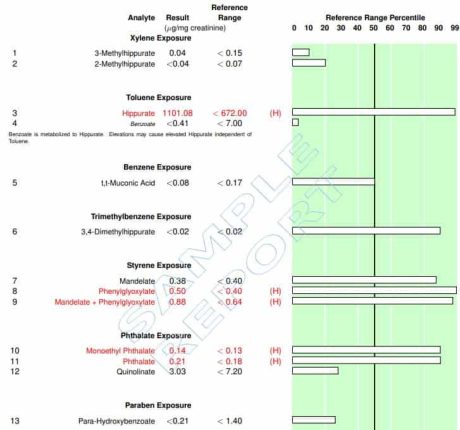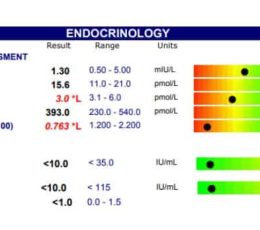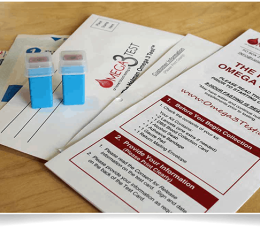MycoToxins Testing
Why test for Mycotoxins?
Mycotoxins are some of the most prevalent toxins in the environment. Mycotoxins are metabolites produced by moulds which can infest buildings, vehicles, and even foods. However, most mycotoxin exposures are through food ingestion or airborne exposure. In the European Union, 20% of all grains harvested have been found to be contaminated with mycotoxins. Unfortunately, mycotoxins are resistant to heat and many processing procedures.
Mould can grow on almost any surface, especially if the environment is warm and wet. Inner wall materials of buildings, wall paper, fibreglass insulation, ceiling tiles, and plaster-board are all good surfaces for mould to colonize.
Moulds release mycotoxins into the environment causing symptoms of many different chronic diseases. Diseases and symptoms linked to mycotoxin exposure include fever, pneumonia-like symptoms, heart disease, rheumatic disease, asthma, sinusitis, cancer, memory loss, vision loss, chronic fatigue, skin rashes, depression, ADHD, anxiety, and liver damage. With the MycoTOX Profile, mycotoxin exposures can be predicted, allowing recommendations for detoxification treatments.
MycoTOX screens for eleven different mycotoxins, from 40 species of mould,all from a single urine sample.
MycoTOX is the most comprehensive and competitively priced mycotoxin test available.
MycoTOX uses the power of advanced mass spectrometry (MS/MS), which is necessary to detect lower levels of these fungal toxins. The test is also optimal for follow up testing to ensure that detoxification therapies have been successful.
MycoTOX pairs perfectly with the Organic Acids Test (OAT) and the Glyphosate Test, giving comprehensive testing to assess exposure to common environmental toxins – all at a great value, and all from one urine sample.
Glyphosate Testing
Test to see if you have been exposed to high levels of glyphosate. Glyphosate is the world’s most widely produced herbicide and is the primary toxic chemical in Roundup™, as well as in many other herbicides.
In addition, it is a broad-spectrum herbicide that is used in more than 700 different products from agriculture and forestry to home use.
Glyphosate’s Impact on Gut Health
The enzymes of many bacteria are susceptible to inhibition by this chemical, thus altering the microbiota of many animals [and humans] that ingest it. Usage of glyphosate is ubiquitous, and highly associated with genetically modified (GMO) glyphosate-resistant crops that can grow well in the presence of this chemical in soil.
Interestingly toxicity of a surfactant that is commonly mixed with glyphosate, polyoxyethyleneamine (POEA), is greater than the toxicity of glyphosate alone.
Mosaic Diagnostics (formerly The Great Plains Laboratory) offers a urine test for glyphosate. Water samples can also be tested.
Organic Acid Testing (OATS Testing)
Organic acids are products of the body’s metabolic pathways. Evaluation of these downstream metabolites from various metabolic pathways provides insight into important areas related to gut health, mitochondrial dysfunction, neurotransmitter status, indicators of detoxification and macronutrient breakdown and nutritional status. This makes organic acid testing a valuable tool to assess the functional need for essential nutrients, diet modification, antioxidant protection, detoxification, and other therapies.
The Organic Acids Test (OAT) provides a comprehensive nutritional and metabolic snapshot of an individual’s overall health. The OAT measures 76 organic acids from one easy to collect urine sample.
Who Might Benefit from the OATS Test?
The OATS Test provides useful information about how well an individual’s metabolic pathways are functioning. Revealed imbalances may provide guidance around the underlying contributors to both symptoms and disease states – with improvement of associated symptoms and overall health when clinically addressed.
Symptoms and diseases associated with nutritional deficiencies and other metabolic imbalances:
- Anxiety
- Autism Spectrum Disorders
- Depression
- Diabetes
- Digestive Disorders
- Fatigue
- Fibromyalgia
- Gastrointestinal dysbiosis
- Insulin resistance
- Neurological Disorders
- Obesity
- Optimizing health
- Psychological Disorders
- Vulvodynia
The OATS test report is organised into clinically useful categories including:
Intestinal Microbial Overgrowth
- markers evaluate for candida activity, clostridia bacteria toxins, potential mold exposure, and imbalance in the gut microbiota
Oxalate Metabolites
- provide insight into oxalate levels being generated by organisms within the system or via dietary contributions.
Glycolytic Cycle Metabolites and Mitochondrial Markers (Krebs Cycle and Amino Acid Metabolites)
- evaluate for metabolic efficiency (e.g., use of glucose and amino acids for energy generation) and mitochondrial dysfunction.
Neurotransmitter Metabolites
- evaluate for phenylalanine, tyrosine and tryptophan metabolism which are linked to neurotransmitter status and quinolinic acid production.
Pyrimidine Metabolites & Ketone and Fatty Acid Oxidation markers
- give insight into folate status and cellular turnover, as well as mitochondrial utilization of fatty acids for energy production.
Nutritional Markers
- provide insight into the sufficiency of essential vitamins, antioxidants, and metabolic pathway co-factors.
Indicators of Detoxification
- assess for the presence of oxidative stress via markers of glutathione sufficiency and methylation versus transsulfuration function.
Amino Acid Metabolites
- may suggest functional nutrient need or be reflective of genetic metabolic dysfunction if a consistently, persistently elevated level of a particular analyte is noted.
The Mineral Metabolism marker
- provides insight into dietary intake of phosphate and can give insights into Vitamin D levels.
Organic Acid Test: Food Restrictions
The following list of food items are advised to be avoided for 48 hours prior to collection.
- Beverages: Tea & Coffee, Alcoholic Beverages, Juices (see vegetable & fruit list below)
- Seeds/Nuts: Walnuts, Pecans
- Vegetables & Fruits: Avocado (Guacamole), Tomato, Banana, Grapes/Raisins, Kiwifruit, Pineapple, Plantain, Plums/Prunes
- Other: Aged and Processed Cheeses, Jelly/gelatin, Vanilla Extract, Ketchup/tomato sauce.
Questions regarding diet and allergy are directed towards the ordering healthcare practitioner.
This test is not suitable for ages younger than 2 years. For a sample report CLICK HERE
Test results should be assessed by the practitioner in light of the patient’s full medical history. Accordingly a consultation is required to discuss the results in the context of your current health.
NOTE THE ENVIRONMENTAL TOXINS TEST IS CURRENTLY NOT AVAILABLE: Environmental Pollutants or Volatile solvents are used commercially in the manufacture of plastics, paints, varnishes, resins, synthetic fibers, rubbers, lubricants, dyes and industrial cleaning agents. They are a natural part of gasoline, airplane fuel and cigarette smoke.
Phthalates are used in the manufacture of plastics to allow for flexibility. They are widely used in personal care products and food packaging.
The Environmental Pollutants Profile (EPP) provides quantitative measurement of 6 select metabolites of volatile solvents:
- xylene
- toluene
- benzene
- trimethylbenzene
- styrene
- phthalates
Analysis is performed through GC/MS.
Available from a first morning dried urine spot specimen collection.
Note that the Environmental Pollutants test does NOT measure minerals or heavy metals. These are best tested using laboratory assessment of a hair sample, or by a separate urine test – please contact us.
Environmental Pollutant Testing – Food Restrictions
Avoid food products containing the following preservatives 48 hours prior to urine collection:
- Sorbic Acid/Sorbate (E 200-203)
- Benzoic Acid/Sodium Benzoate (E 210-213)
Are there age restrictions for testing?
- Not suitable for ages younger than 2 years.











Reviews
There are no reviews yet.